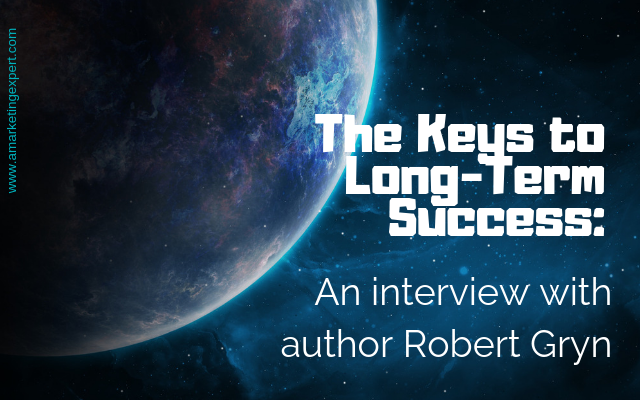The road to success can seem really long when you’re in the thick of writing your next book and trying to make time for book promotion.
There aren’t enough hours in the day so a lot of us put our blinders on and just keep pushing through on autopilot as best we can. And while I can applaud your commitment, I want you to stop and take stock of your long-term plan.
Because my team and I have had the pleasure of working with author Robert Gryn, www.robertgrynbooks.com and amazon.com/Robert-Gryn, on multiple titles and I have to say he’s one of the most thoughtful authors we’ve collaborated with when it comes to really understanding the needs of his audience, the evolution of his genre, and the role he needs to play in his own success, which I’m honored to say, has included our book promotion support as well.
Please take a moment to read this Q&A we did with him, which was inspired by some information he shared during the discovery process for his latest book promotion campaign with us.
Not only will you get a taste for what a great writer he is, his insight is thought-provoking, and his tips are effectual. And it will be nearly impossible to walk away from this without inspiration for what your future can hold if you really commit to serving your audience and pushing yourself to release the autopilot…and you get a pretty kickass prediction of where science fiction is going, so get ready to geek out a little too
AME: You have said, “As sci-fi and fantasy have grown in popularity, I believe many readers have reached the point where mundane space operas and swords-and-sorcery tales have become boring and commonplace.” Can you expand on this a bit, what fueled this assessment? Do you follow reader groups, etc.?
Robert Gryn: I realize now that the statement above is somewhat misleading. I think that most readers who pick up sci-fi and fantasy books do want the recognizable stories of spaceships or knights in shining armor. Sci-fi and fantasy have gained a great deal of popularity in recent years partially based upon this growing familiarity with particular styles of stories established in the genre. People also respond to the familiar and the well-known. Perhaps that’s also why we like sports so much. It’s the same stories told with only a few new twists. Sci-fi and fantasy has become like other more well-known genres and in doing has established certain tropes, archetypes, and so on. The effect of all this is that more people are interested in sci-fi and fantasy stories.
When I say that there are many readers who have grown bored of the same old, I’m talking about a certain minority within this growing audience. It’s a somewhat natural progression for those of us attracted to sci-fi and fantasy in the first place. You pick up a book about space exploration in the solar system because a part of you wants to leave the world you know behind. But after a few books about space explorers, you grow bored again and you want to leave that behind. Maybe you want to read about exploring the deepest parts of the galaxy or about travel to the end of time. For some of us, that’s enough, but there are those for whom it never is. Like an addict we want that next fix of the fantastical and the imagined probable to be that much more. With our world now fully mapped by satellites, such stories become the refuge of those born with the need to see past the next horizon.
I base this assessment on my own tastes and a constant high-level sampling of the stories that percolate to the top of the sci-fi and fantasy zeitgeist as well as those that lie on the outskirts. I see certain kind of stories attain the elevation to film, tv/film series, or even universe (the highest popular accolade for storytelling these days). Most of these fit well into the sub-genres that have been established within sci-fi and fantasy but more and more there will be the outliers who push the boundaries of the genre. I’m heartened to see stories like Mortal Engines, The Golden Compass, or Mandy reach wider audiences. Even if they don’t meet with critical or financial success, the openness to explore strange stories is encouraging. Not to say that these exploratory works didn’t exist before, but that more and more they appear in the mainstream of popular thought, claiming a current or two and maybe slightly changing the direction of the river as a whole.
I’m not sure how one could measure whether this is true. When I think of the stories of the 70s and how much they expanded our views, I wonder if what we’re seeing is another revolution of the same cycle. What I can say is that general sci-fi and fantasy is a major part of popular culture now as opposed to the 80s and 90s when I was growing up. Back then such stories were on the boundary of the mainstream and now they have come to dominate parts of it. Consider superhero stories, a sub-genre of sci-fi and fantasy. Before the 2000s superhero stories belonged only in cheaply printed comic books and now they are the benchmarks of the Hollywood blockbuster. We don’t need to debate the artistic value of such stories here, suffice it to say, that their rise to preeminence is a sign of the general acceptance of stories that used to be marginalized and dismissed as without value or as unwelcome in the mainstream of storytelling.
As an author who is one of those people who always needs the next story to be something more, something not yet seen, the general trend to accept sci-fi and fantasy works well for me. As popular works of the genre become the fodder for watercooler conversations on Monday morning, as we’ve seen with series like Game of Thrones, the outskirts where I dwell become more and more visible. And as the general audience of sci-fi and fantasy grows so does the portion of those like me who always want to see something new and original.
AME: Do you feel this is likely a real issue for a lot of genre fiction categories?
Robert Gryn: Science fiction and fantasy is a curious genre where a work can be considered great because of how well it fits in or how well it doesn’t. Stories that don’t exactly fit into established bounds can expand the borders of the genre. Because the genre supports its own subversion it allows constant expansion of its periphery.
I don’t know if the same can be said of other genres. People who grow tired of romance novels probably will not look for romance novels that break the genre. Or who knows, maybe they do if the genre-breaking is done well enough. It’s just not the defining quality of any other genre to constantly try to be something different. Perhaps the closest is magical realism. The drive in magical realism is to expand our appreciation of the real world through some fantastical alteration of that world. But magical realism, by its nature, needs to remain grounded in the real world. A magical realism story can only be pushed so far before it becomes sci-fi or fantasy.
AME: How did you decide to combat this with your new release, Two Skies Before Night?
Robert Gryn: My instinct in storytelling is to always find something new or some new combination of ideas. I find it difficult to write something that isn’t in some way weird to me. When I try to write regular fiction I quickly become bored and start daydreaming about places and events far away from that particular story. That said when starting on a new novel I usually set up some ground rules to keep it accessible.
In Two Skies Before Night, I decided to try to write a somewhat regular murder mystery from the perspective of only the protagonist. I grounded the story in the crime noir tales of the early 20th century while setting it in a fantastical city populated by people who can only exist in our imagination. This blend of recognizable core story and impossible setting is how I hope to capture the attention of readers.
Of course, there’s more to the story of Two Skies Before Night than some yarn about a simple murder, but that would be giving away too much. After establishing the grounded core narrative, I allow myself digressions and even subversions of my own plot to make the journey more interesting.
AME: Do you want to make any predictions for the future of science fiction? No pun intended.
Robert Gryn: This question sounds like a writing prompt of a sci-fi story: Write a sci-fi story as it would be written by a writer a 100 years from now. What advances in science and technology will make certain sci-fi stories obsolete while creating whole new vistas we can’t yet imagine. Perhaps, in this future, we’ll find that the very idea of starships is an anachronism and that the only way to travel through interstellar space is by the mind leaving the physical body. In such a future, there might be a whole genre of space operas where no one physically leaves their planets as their mental projections clash in the void.
As for where I think the future of the “genre of the future” is headed, I see both the good and the bad. All things ossify given enough time and we become used to what we experience. We can all mention a number of sci-fi and fantasy stories that continue to see unnecessary volumes or sequels. The sci-fi and fantasy market is becoming flooded with books and films that struggle to differentiate themselves from each other.
On the other hand, and as I mentioned above, all this means that what used to be considered the purview of the weird and the outlier has now become somewhat commonplace. I remember being picked on in grammar school for reading sci-fi and fantasy books. And now I see the cool kids wearing t-shirts with the characters from those same books. Those of us who want to keep looking beyond the edge of what we’ve imagined, are becoming more and more accepted by society. The stories that used to be the edge become mainstream and the edge is born anew with each iteration. I see the writers of tomorrow continuing to push past the borders of what we’ve experienced.
In a way, sci-fi and fantasy is the future of all writing. Don’t get me wrong, there will always be stories of the now and the real. There is an undeniable value to the examination of the real world through the lens of fiction. But as the world continues to build upon its progress, the most thought-provoking examination of the sentient condition will be through stories that lie somewhere between what we today think of magical realism and sci-fi/fantasy. I see a time when such thought experiments will be the height of storytelling.
Then again, if the world loses its way and progress grinds to a halt, the future of imaginative literature will become bleaker and bleaker. In the realized dystopias of such all-too-near tomorrows, the stories that will matter will be histories and myths. Or perhaps fiction will be outlawed altogether and replaced by the real-truths of totalitarian cyber-societies.
I often think of how my stories will be viewed by some future readers. Will they think them old-fashioned and anachronistic like we see the sci-fi stories of the early 20th century? Or will they find in them at least small ideas worth contemplating? Perhaps this is why I write of such far-off places and such distant futures. So that I have more time to be proved wrong in my predictions and visions.
AME: Do you have any tips or recommendations to help other authors figure out how carve a unique path while also honoring what readers love about their genre?
Robert Gryn: I would say not to worry too much about honoring anything other than the spirit of exploration. To those of us who embrace the spirit of sci-fi and fantasy, your unique path is the thing that we want to see honored. Write about the spirits of the pharaohs returning to possess the next generation of AI supercomputers or about the ancient tales of the space explorers who crashed landed on Earth and devolved to become octopuses or about the mundane life of a woman living 100,000 years from now. People like me will want to read, hear, or see all such stories.
Find whatever your crazy idea is and embrace it and then write about it as if it was a story about going to the grocery store or about a girl meeting a boy or about a detective investigating a murder. You can write about anything if you ground it in a recognizable narrative structure. We all want to read about people we relate to. They don’t even have to be people but we have to find some common ground to give us a footing in the story and from there we can go anywhere.
Also, don’t worry if you find some your ideas aren’t always unique. There has to be a balance between the known and the unknown in any story. You need the established and the recognizable to serve as a foundation for the weird and the impossible. The best stories marry the mundane and the sublime, and that’s what we should aim for as writers.
Fortunately for us, and for fans of science fiction, there is absolutely nothing mundane about author Robert Gryn.
And I want to officially thank him again for what he’s bringing to the table and the bar he’s setting not just for his genre, but for writers in general.
With over 4,000 books published every day you certainly won’t stumble upon long-term success by accident, or through luck, or simply because your book appears on Amazon.
It takes hard work, critical thinking, a solid publishing schedule, regular self-promotion, and oftentimes a book marketing collaboration or two. If you’re ready to hire a book marketing company (read this to learn more about the investment), please contact us to learn more!
I’d be honored if you shared Robert’s insights with your network! Here are some tweets I’ve prepped for you:
Click to Tweet: Check out this kickass prediction about the future of the sci-fi genre from @RobertGryn in an interview with #bookgal. #bookmarketing #scifi #amwriting https://bit.ly/2CXWK2S
Click to Tweet: Taking sci-fi to new levels, author @RobertGryn talks the future of the genre, insights for authors, and the spirit of exploration in this #interview with @bookgal. #bookmarketing #amwriting https://bit.ly/2CXWK2S




0 Comments